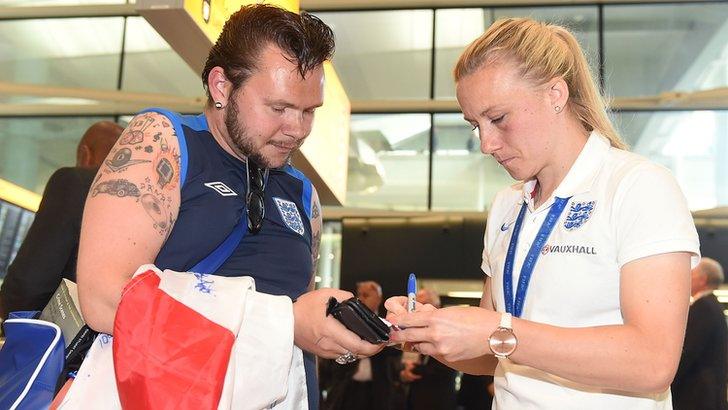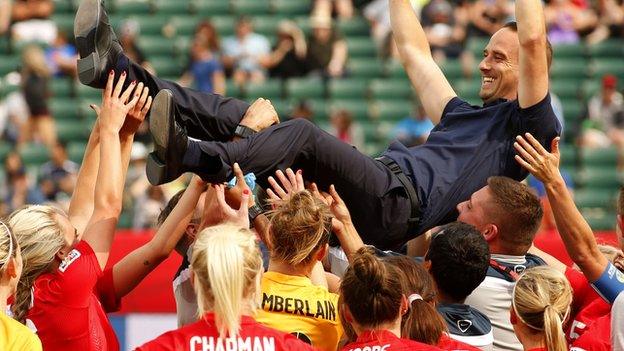Women's World Cup: Crowds, keepers & heroic England
- Published
So after 52 matches and a thrilling final win for the United States, the biggest and perhaps best Women's World Cup comes to a close.
Interest may have been mixed in Canada, but with record TV audiences across the globe and 24 teams competing for the first time, Fifa has succeeded in taking the game to new frontiers.
There were fears that artificial turf might disrupt matches and cause injuries. The only ailments have been some nasty turf burns.
Despite that, there have been thrilling games, shocks aplenty, inspiring stories and even a new twist on England crashing out of the tournament in heartbreaking fashion. It all points to a sport that has never been in better health.
So what were the highs and low aspects of the seventh World Cup?
Warm welcome, thrilling ties & wonderful finale
More teams, more excitement
With eight new teams joining the party, bringing the total number of sides at the 2015 edition to 24, there was scepticism it would dilute the competition and turn the tournament into a split between the new kids on the block versus wily veterans.
As it turned out, three debutants made it through to the second round, including Cameroon, who shocked Switzerland in the group stages to win 2-1.
Colombia, ranked 28th, went one better by beating France, ranked third. In that game, Colombia forward Lady Andrade was the perfect example of a previously unknown player using the world stage to showcase her skills to a new global audience.
Kindness of Canadians
When you arrive in Moncton, population 64,000, on Canada's east coast, and are told that you will be getting a free upgrade on your hire car, the first thought is "what's the catch?" No catch, just a typical example of the friendliness on offer from people who populate this huge country.

The England players were keen to stress how grateful they were for the welcome they received
Service in restaurants and bars is first class and it is hard to think of many days here where our group hasn't made new friends.
Lionhearted luminaries
At previous tournaments I have followed, England's campaigns have usually ended in misery or at best, glorious failure.
The semi-final loss to Japan appeared to consign Canada 2015 to the latter category for England. And then watching the Lionesses finish third, the best World Cup performance by a senior England side since 1966, put a real gloss on the tournament.
It was fun to watch the players cut loose with bronze medals around their necks after almost six weeks away. They deserve the accolades that will undoubtedly come. As their manager Mark Sampson has said, they are not just special players, but special people.
Capturing the world's imagination
British audiences have lapped up England's success with up to 2.5m watching each game and 11.9m watching some part of their journey to third place. And that has all come despite the late kick-offs which were at midnight BST for the quarter-final and semi-final.
England v Japan - grabbing people's attention |
|---|
The semi-final match peaked at 2.4m viewers on BBC One, with average viewing figures of 1.7m. |
The match report was read by 1.3m while 479,000 read the live text and more than 300,000 watched online highlights of the game. |
The success has also been replicated across the globe. American network Fox Sports have reported record figures for United States games, with 8.4m watching their semi-final win over Germany while over 11m people in Japan watched their team's matches en route to the final.
Canadians might not have turned up in huge numbers to games which haven't involved the hosts, but people have been taking note across the globe.

Canada fans gave their own team superb support but were less eager to attend matches involving other countries
Raising the bar
Often one of the first sticks that women's football is beaten with, goalkeeping has improved markedly in this tournament. Even the Ivory Coast keeper Dominique Thiamale had a good game despite her team losing their opener 10-0 to Germany. Without her it could have been a lot worse.
Germany's Nadine Angerer and America's Hope Solo have led the way again.
Although some will question the performance of Japan's Ayumi Kaihori after she was beaten by America's Carli Lloyd in the final, the consistency across the board has risen.
Final flourish
Women's World Cup 2015 final highlights: USA 5-2 Japan
If organisers hoped the tournament would finish with a flourish, then they certainly got their wish.
It was the highest-scoring final in the tournament's history, matching the highest-scoring men's final of 1958 when Brazil defeated Sweden by the same scoreline.
Carli Lloyd's 13-minute hat-trick was impressive enough, but her wonder goal from the halfway line almost made the United States fans tear the roof off BC Place. Previous champions Japan could not live with their more powerful opponents.
Referees, pitches and a moment of heartbreak
Lack of World Cup fever
When I asked Canada coach John Herdman whether he regretted not taking up the England post he was tipped for after defeat by Sampson's side in the last eight, he insisted that Canada was a "real footballing country".

The USA were well supported - but in general stadiums were rarely packed to the rafters
It's true that the team has been well supported, setting a new Canadian soccer attendance record in that match of 54,027. Apart from the hosts' matches, though, attendances have been mixed and the 31,467 fans at England's semi-final was disappointing.
Time for clean underwear
Not really a low as covering England for a month has been a privilege, but working across the breadth of Canada's five time zones has caused its own challenges, and not just with jet lag.
If I had a dollar for each time one of the team had said: "What time is it here? And what time is it in England?" I would be returning home a rich man. When you rush for the next flight and start leaving all your clean underwear in the drawer of a Vancouver hotel, you know you need more hours in the day.
Record attendances - really?
Figures from Fifa will show that this is the highest attended Women's World Cup in history - with 1.35m beating the previous best of 1.19m for the 1999 World Cup, held in the United States.
However, this total also includes inflated attendances for double headers held during the group stages. Buying one ticket would get you entry to two games, but your attendance would count twice.
It did not matter that you decided to miss the first game, Fifa counts the attendance at 75 minutes of the second game and then doubles it. That was despite some stadiums being half empty for the first of the day's two fixtures.
Ditch the synthetic surfaces
Following the threat of player boycotts and lawsuits, the issue of playing on artificial pitches largely faded into the background. Other than the impact on players' bodies after playing games in quick succession, there appear to have been few serious injuries.

The artificial surfaces were far from universally popular
However, there is no doubt it has contributed to some technical problems with the ball sticking to the turf when played through and then rolling away once it spun forwards.
It certainly did not help fast forwards or dribblers of the ball.
It was a good experiment, but it would be dangerous to use this as a precedent for future tournaments. There have been plenty of grazed thighs.
Red card for the referees?
A category that can be split as a high or a low.
Some people I've spoken to enjoy the aggressive nature of women's football when referees allow games to flow. It makes a nice change from the men's game where players will roll around and try to fool referees into thinking they have been fouled.
But there is a danger that referees allow too much to slide and it could have serious consequences. England defender Laura Bassett was fortunate that all she came away with following Camille Abily's elbow was a black eye.
Bassett's unlucky low point
England has become accustomed to losing tournament semi-finals on penalties, but going out to an injury-time own goal - that was a whole new level of heartbreak.
Bassett: I'm heartbroken and devastated
Laura Bassett, who had the misfortune to send the Lionesses out of the World Cup, faced up to her mistake and described to the BBC how she "couldn't breathe" when she realised the goal had gone in during a tear-jerking interview.
Fortunately, the "rock" of the team ended the tournament with a smile. No player was more relieved after the third-fourth place play-off win over Germany, during which she was a colossus.
- Published6 July 2015

- Published4 July 2015

- Published5 July 2015

- Published5 July 2015

- Published20 June 2016

- Published7 June 2019
